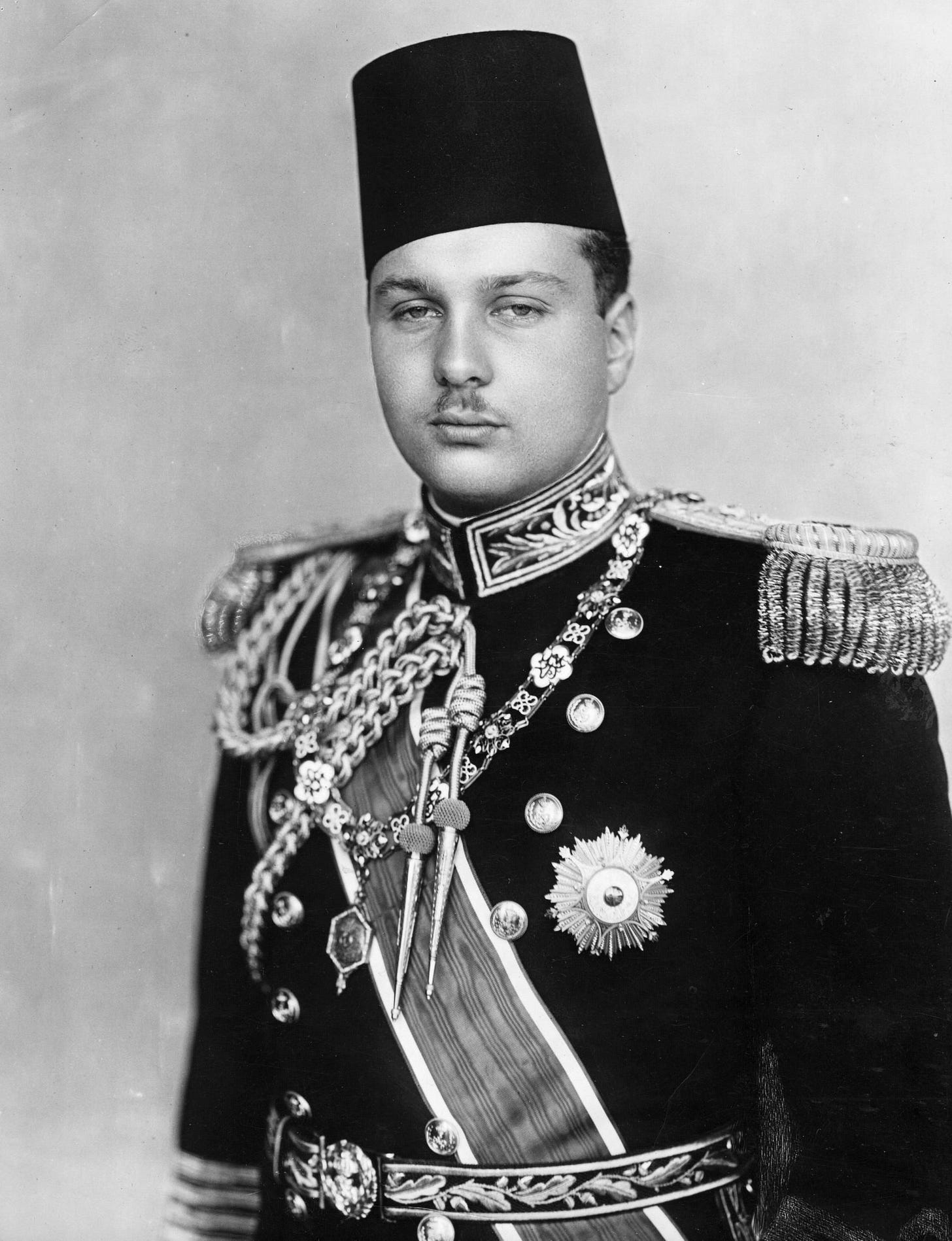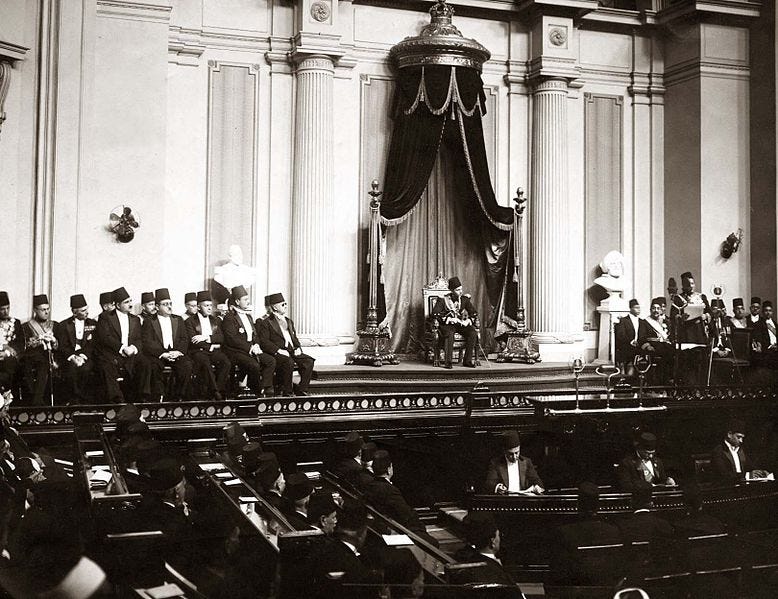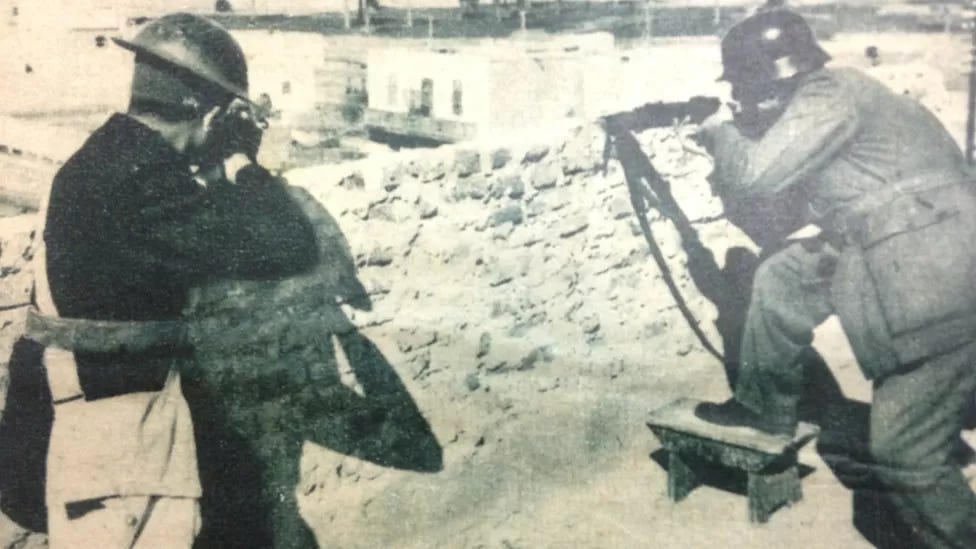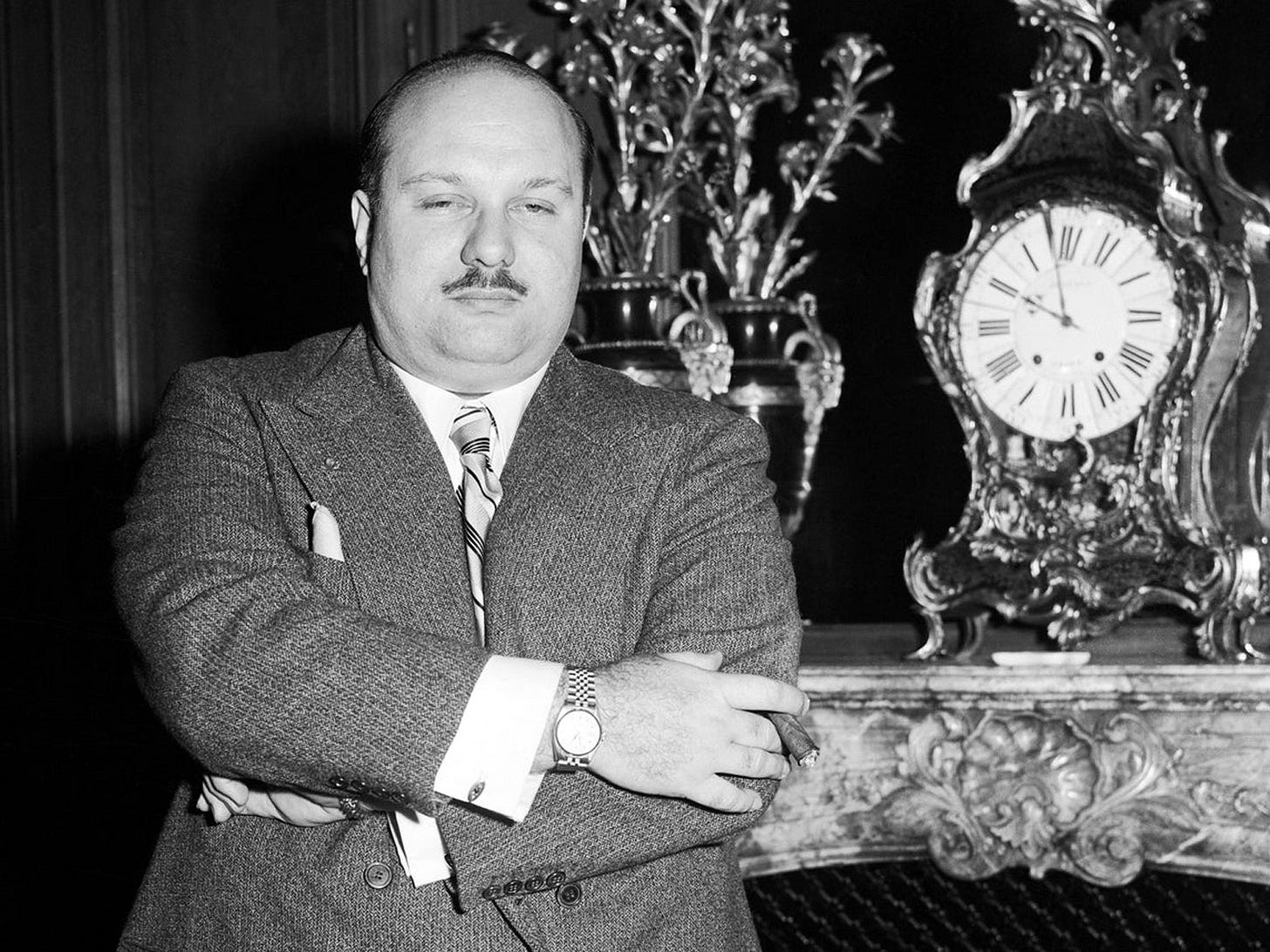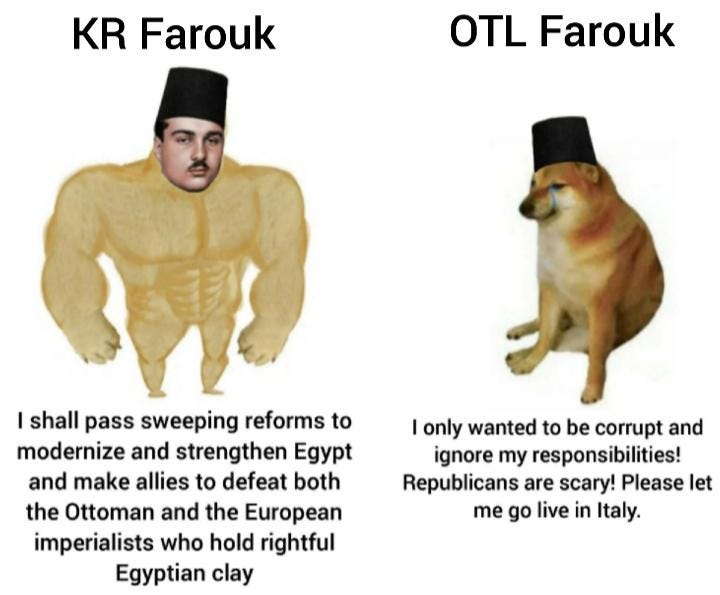I’m not a MENA expert or historian, but I was in a class on Middle Eastern revolutions so I feel obliged to drop on you, dear readers, what I pried through for in my research for class. This particular topic also marries some of my favorite things, quirky historical figures and althist mods of HOI4. So here we go:
Farouk bin Fuad
Farouk was born on 11 February, 1920 in Cairo as Farouk bin Fuad, the first child of Fuad I and his second wife. Fuad insisted that Farouk learn Arabic, so that he could speak to his subjects (Fuad himself could not speak Arabic).
Farouk hails from the Muhammad Ali dynasty,1 which came from the Ottoman Empire. Muhammad Ali, an Ottoman army leader of common Albanian origin, came to Egypt with Albanian mercenaries after a power vacuum left by Napoleon’s adventure in the country. Seizing power from the Mamluks, he sought to reorganize the country and transform it into a modernized state, with a long-term ambition to step out from the Ottoman’s shadows.
Farouk’s grandfather, the Khedive of Egypt Ismail the Magnificient, would similarly attempt to modernize Egypt and wanted to transform the country into a strong and independent power. Under his reign, the Urabi Revolt broke out, which came about due to dissatisfaction with European control over Egypt. The British and French applied pressure to suppress Colonel Ahmad Urabi’s rise and Ismail neglected that concern. The British invaded Egypt, and Ismail was exiled to Italy, after having had to make his son, Tawfik Pasha, the successor.
In 1935, Farouk was sent away to study at the Royal Military Academy in England, at the behest of Sir Miles Lampson, the British High Commissioner in Egypt. Fuad, an Italophile, actually wanted him to go to the Turin Military Academy in Italy, but was overruled in favor of British interests.2
During his time in London, Farouk was an extramural student and attended class occasionally. He was known to locals as “Prince Freddy.” Overall, he was more concerned with shopping than with academics. He reportedly failed the entrance exam to the academy, with one tutor claiming that he expected answers to be given to him.
The boy-king
Fuad I passed away from a heart attack in 1936, paving the way for crown prince Farouk to ascend to the throne. Farouk was in still at the Military Academy in Woolwich, and was merely sixteen at the time. He made his return to Egypt, stopping in Paris to shop and visit Elysee Palace.
Arriving in Alexandria, he was greeted warmly by large crowds. It appears that the youth of the king and the unremarkable reign of Fuad I created a combo where Farouk was seen as a symbol of the changing times, giving him strong goodwill with the nation. After his coronation, Farouk made a public address in Arabic, which was broadcasted through the radio — the first time a sovereign did so in Egypt. He declared:
“I am prepared for all the sacrifices in the cause of my duty… My noble people, I am proud of you and your loyalty… We shall succeed and be happy.”
Narrator’s voice: he did not sacrifice, and they did not succeed or be happy.
However well-spoken he was and however many goodwill he had, Farouk was unfortunately still unprepared for the duties of ruling over Egypt. And that unpreparedness would the the seeds of his undoing.
Reign
Farouk’s rule was a relatively mixed bag, with goodwill and strong support in the beginning, before declining into a reputation of playboyism. I will highlight some notable episodes and events during his reign (1936-1952) here.
One of the first episodes during Farouk’s reign was the Anglo-Egyptian Treaty of 1936. Under the Treaty, the British began to withdraw to the Suez Canal (except for Sudan) and renegotiated some more terms of independence for Egypt, but the country is still beholden to British foreign policy interest. Many remain unsatisfied by the new treaty, as they wanted full independence. This sparked a wave of anti-British demonstrations, as well as anti-Wafd sentiments since they supported the Treaty.
In 1938, Farouk married Safinaz Zulficar, the daughter of an Egyptian judge. She took up the name Farida when she became queen. They had three daughters, but Farida increasingly came under pressure to produce a male heir. This would ultimately lead the couple to divorce in 1948.
In 1940, when Farouk caught his mother engaging in an affair with his former tutor (he was reading the Koran to her), he pulled out his handgun and threatened to shoot them.
In February 1942, with the backdrop of WWII, Sir Lampson pressed Farouk to form a Wafd government under Mostafa el-Nahhas, believing that they would be more willing to help the British war efforts and would curtain pro-Axis influences in court and cabinet.3 Farouk rejected this demand. Thus, the British concocted a plan to get their way. British soldiers surrounded and entered into Abdin Palace, giving him a choice: form the government or abdicate. Farouk capitulated, and Nahhas became Prime Minister. The Abdin Palace incident was a humiliating moment for Farouk,4 showing that he was merely a meek puppet of the British. Many, including General Mohamed Naguib, cited this episode as the beginning of the decline of popularity for Farouk.
Farouk stole Winston Churchill’s pocketwatch5 during their meeting in August 1942. He returned it, saying that he was only playing a prank, because the British were known to be “practical jokers.”
Farouk sported a large car collection, a notable one being a Mercedes-Benz, which was a wedding gift from Adolf Hitler in 1938. He painted them all red, and made it illegal for people in Cairo to own red cars.
Farouk got into an automobile accident in late 1943 when driving in his red Cadillac to Ismailia. He was put on a stretcher, but he was too heavy and it broke. Hospitalized at a British military hospital, he became so “interested” in the British nurses that he faked being injured longer, leading him to miss the Cairo Conference, which the Allies had organized.
Farouk banned the film Quo Vadis (1951), fearing that the Egyptian audience may draw comparisons between Emperor Nero and him.
In 1951, Farouk married Narriman Sadek, a middle-class commoner. She was eighteen when they were married. Allegedly, Farouk became smitten with her because he thought she would be able to give him a male heir.
The Persian connection
In 1939, one of Farouk’s sister, Fawzia, married Mohammad Reza Pahlavi, the son of the Shah of Iran (at the time). He ascended to the throne in 1941, and she became queen of Iran. They had one daughter. However, the marriage broke down, and Fawzia filed for an Egyptian divorce in 1945. On the Iranian side, the divorce was not recognized until 1948.
Interestingly, the two men, Farouk and Mohammad Reza planned the announcement their divorces on the same day, in order to distract the national media in both countries (and international intrigues).
After the Iranian Revolution, the Shah would go into exile first in Egypt.
The beginning of the end
In 1950, Farouk brought back the Wafd government after forming an alliance with one of their leaders Mostafa el-Nahhas Pasha (old friend!), which surprised many observers.
While the Wafd was a major liberal nationalist and anti-British party, they had failed to fulfill that promise and the government led by them were often corrupt. Combined with their inability to mobilize the youth, Egyptians became disillusioned with the Wafd. Other organizations emerged to be strong anti-British voices as well, notably the Muslim Brotherhood and the Egyptian Communist Party.
In late 1951, fearing that Farouk will dismiss the government soon, PM Nahhas decided to abrogate the 1936 Treaty, perhaps as a sort of final “F— you” to Farouk or the British. The announcement was celebrated by Egyptians, with many taking up arms to force the British out of the Canal Zone. These fighters (fedayeen) were backed by the Free Officers Movement, a then-secretive organization of nationalist military officers from middle-class backgrounds, headed by Colonel Gamal Abdel Nasser.
In response to the abrogation of the treaty, the British expanded their military presence in Egypt and the Canal Zone, and began to apply pressure on Farouk and Egypt to reverse their decision.
On January 25, 1952, the British army came to Ismailia, which was named after Farouk’s grandfather and borders the Canal Zone, with an ultimatum to Egyptian police forces, essentially demanding them to hand over weapons and leave the city. Minister of the Interior Fuad Serragedin Pasha approved the police forces’ decision to reject it and stand firm. The battle was an over-match for the Egyptians, leading to the stand ending in heavy Egyptian casualties.
Downfall
The next day, people in Cairo heard about the battle and came out to the streets to protest, agitating against British presence in the city and the country. However, the demonstration turned into a riot and arson, with several buildings in the European quarter burnt down. January 26, 1952 was now known as Black Saturday or the Cairo fire.
During Black Saturday, Farouk was holding a banquet for military officers, celebrating the birth of his son, Fuad. The next day, Farouk dismissed the Wafd government and announced martial law. However, the new cabinets formed were short-lived, lowering the legitimacy of Farouk and confidence of Egyptians in the monarchy. These so-called “salvation” cabinets did little to quell the unrest and doubts in the country.
The monarchy found out the dissenting officers and was set to arrest them. Nasser and the Free Officers were tipped off on July 19 about the coming arrests though, and moved up their timeline to take power.
On July 23, 1952, the Free Officers forced Farouk to abdicate in favor of his six-month-old son. In fact, the CIA covertly backed Nasser to overthrow him, with the codename Project FF.6 When the military came to get Farouk at the palace, he began sniping with his hunting rifle from the rooftop. Allegedly, authorities found a large softcore pornography collection that was left behind in the palace.
A year later, Egypt was declared a republic, and General Naguib, the public figurehead of the Free Officers, became the first President.
In exile
Farouk sailed to Capri on the royal yacht El Marousa, the same yacht that brought his grandfather Ismail to Italy when he was exiled (very ironic). Farouk was indicted for treason by the new Egyptian government in late 1952 and had his Egyptian citizenship revoked in 1958.7
In exile in Italy and Monaco, Farouk maintained his materialistic and playboy lifestyle. In a press conference after arriving in Italy, he claimed that he was now poor, but he was able to send his kids to Institut de Rosy and rented a large estate outside Rome.
In 1954, Narriman Sadek divorced him and returned to Egypt because of his philandering ways. Farouk took on multiple mistresses and engaged in several affairs. In his last years, he associated himself with a singer from Naples named Irma Capece Minutolo, who was several (and I mean several) years younger than him.
In Rome, he gained the reputation as a king of the night, often seen socializing and gambling into the late hours in nightclubs. Interestingly, one of his friends was the notorious Italian-American mafia boss Lucky Luciano, who himself was also in exile.
Farouk was quoted remarking, “There will soon be only five kings left: the kings of England, diamonds, hearts, spades and clubs.”
In 1965, Farouk collapsed during his midnight dinner at the Ile de France restaurant in Rome, having feasting on oysters and lamb. He died as he has lived, in extravagance.
A legacy in another life
Farouk features in many alternate history mods on Hearts of Iron IV. In the althist mod Kaiserreich,8 he appears as the leader of Egypt (duh). Unlike in real life though, in the KRTL,9 he’s not an incompetent flunky, and more importantly, under his leadership, Egypt forms the Cairo Pact, with the country leading Arab nations and peoples in a war against the Ottoman Empire. From my experience playing, the majority of the time the Egyptian AI is successful. However, Egypt content is being reworked, so this may change.
In The New Order,10 Farouk is still a hedonist and materialistic leader, but with a twist — he is about to embark a world tour at the beginning of the game: Farouk's Wild Ride. He will die during this binger, leaving Egypt in crisis, torn between Italian demands and domestic factions like the Wafd, Free Officers, and Muslim Brotherhood. Further information about this alternate history scenario can be found here.
In Thousand-Week Reich,11 Farouk is the starting leader of Egypt. The situation here mostly similar to OTL,12 with the Free Officers coup/revolution on the horizon. The main difference was that Farouk could ask for British or Italian assistance in suppressing the Free Officers, which in turn makes him subordinate to either the British or Italian Empire.
aka the Alawiyya/Alawite or Khedival dynasty
The interests being fears of fascist Italy’s Mare Nostrum plans for the Mediterranean
Despite the Wafd’s renown as the anti-British party, they feared Italian influence in the country as well, and thus were amenable to dealing with the British
Humiliating for the Wafd too — it showed that they were beholden to the British rather than being anti-British
He had one of his servants do the dirty work
Short for “Fat Fucker”
He was granted Monegasque citizenship by his friend Prince Rainier III
What if Germany won WWI (start date 1936)
Kaiserreich Timeline
What if Germany won WWII but grimdark (start date 1962)
What if Germany won WWII but realistic (start date 1952)
Our Timeline





